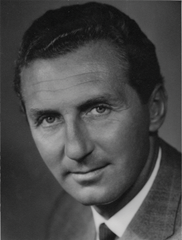Terence Gavaghan
 1 October 1922 – 10 August 2011
1 October 1922 – 10 August 2011
Irishman, humanitarian and colonial administrator
The life of Terence Gavaghan captured the complexity of a man born in India and searching for an identity: administering a British colony and then helping it and others to achieve their independence and succeed thereafter.
His Irish roots ran deep and were a source of great pride. Gavaghan’s great- grandfather, Patrick, emigrated from Mayo during the Famine and found a job at Hackney railway station. Patrick sent his son, Lawrence, to work on the South India Railways. Lawrence’s son, Edward, was orphaned, sent to a Jesuit college in England and returned to India later in life as a chartered accountant. He eventually became Comptroller General of the Indian Civil Service.
Terence was born in Allahabad and also received a Jesuit schooling at Stonyhurst College, before gaining a Harkness Scholarship to the University of St Andrews. His own colonial career began in Kenya where he served as District Officer and District Commissioner.
That work included being an officer in charge of rehabilitation after the Mau Mau uprising. Around 80,000 Kikuyu males had been arrested and detained to end the insurgency and he was tasked with unblocking the detention system. His MBE and promotion to Government House followed as a reward. Independence was approaching and Gavaghan ensured that former Mau Mau were not excluded from Civil Service posts. When visiting in later years, he received warm welcomes.
He wrote of his Kenyan experiences in two vivid and detailed books: ‘Of Lions and Dung Beetles’ and ‘Corridors of Wire’. In the latter account, he fictionalised himself as Larry Corrigan, a character who warned of “the warping experience of exercising state authorized power over other human beings”.
Joining a United Nations mission in Somalia in 1962 led into humanitarian work for the following three decades for a range of agencies in 17 countries, among them Libya, Afghanistan, Sudan and Indonesia. The former colonial administrator quietly helped Zimbabwe’s resistance movement during its struggle against the Rhodesian Government.
In the 1970s, the family settled in Enniskerry, County Wicklow, where he was delighted to gain Irish citizenship. Rich friendships were made, including with Madame Gong Pusheng, the People’s Republic of China’s first Ambassador to Ireland. With considerable foresight, he predicted the importance of China’s emergence on the world stage.
Retirement took him to London from 1987 onwards. Gavaghan defended Britain’s role in Kenya in lectures and pointed back to 1923 Devonshire Declaration, a promise to act in the interests of the native peoples.
He is survived by two sons, Kevin and Sean, from his first marriage, and a third son, David and daughter Sarah, from his second. David Gavaghan is well-known locally as the former Chief Executive of the Strategic Investment Board, and two of his children were born in Ulster.
His life bridged the often conflicting identities of Britain and Ireland and the emergence of a new order of independent states from old empires. Family and friends valued his insight, dedication to accuracy and commitment to social justice.





